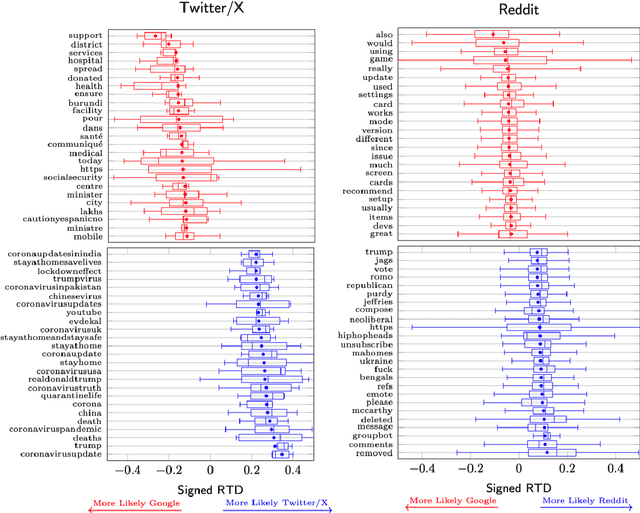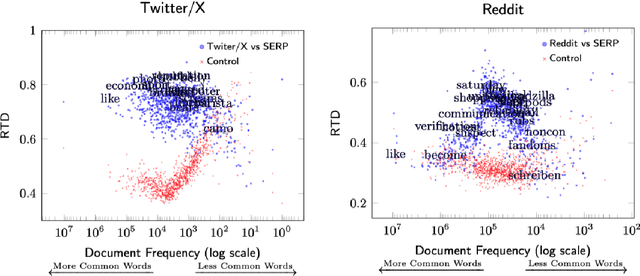Amrit Poudel
The Power of Framing: How News Headlines Guide Search Behavior
Aug 23, 2025Abstract:Search engines play a central role in how people gather information, but subtle cues like headline framing may influence not only what users believe but also how they search. While framing effects on judgment are well documented, their impact on subsequent search behavior is less understood. We conducted a controlled experiment where participants issued queries and selected from headlines filtered by specific linguistic frames. Headline framing significantly shaped follow-up queries: conflict and strategy frames disrupted alignment with prior selections, while episodic frames led to more concrete queries than thematic ones. We also observed modest short-term frame persistence that declined over time. These results suggest that even brief exposure to framing can meaningfully alter the direction of users information-seeking behavior.
Social and Political Framing in Search Engine Results
Jul 17, 2025Abstract:Search engines play a crucial role in shaping public discourse by influencing how information is accessed and framed. While prior research has extensively examined various dimensions of search bias -- such as content prioritization, indexical bias, political polarization, and sources of bias -- an important question remains underexplored: how do search engines and ideologically-motivated user queries contribute to bias in search results. This study analyzes the outputs of major search engines using a dataset of political and social topics. The findings reveal that search engines not only prioritize content in ways that reflect underlying biases but also that ideologically-driven user queries exacerbate these biases, resulting in the amplification of specific narratives. Moreover, significant differences were observed across search engines in terms of the sources they prioritize. These results suggest that search engines may play a pivotal role in shaping public perceptions by reinforcing ideological divides, thereby contributing to the broader issue of information polarization.
* Accepted to ICWSM 2026
Digital Gatekeepers: Google's Role in Curating Hashtags and Subreddits
Jun 17, 2025Abstract:Search engines play a crucial role as digital gatekeepers, shaping the visibility of Web and social media content through algorithmic curation. This study investigates how search engines like Google selectively promotes or suppresses certain hashtags and subreddits, impacting the information users encounter. By comparing search engine results with nonsampled data from Reddit and Twitter/X, we reveal systematic biases in content visibility. Google's algorithms tend to suppress subreddits and hashtags related to sexually explicit material, conspiracy theories, advertisements, and cryptocurrencies, while promoting content associated with higher engagement. These findings suggest that Google's gatekeeping practices influence public discourse by curating the social media narratives available to users.
* Accepted to ACL 2025 Main
Citations and Trust in LLM Generated Responses
Jan 02, 2025Abstract:Question answering systems are rapidly advancing, but their opaque nature may impact user trust. We explored trust through an anti-monitoring framework, where trust is predicted to be correlated with presence of citations and inversely related to checking citations. We tested this hypothesis with a live question-answering experiment that presented text responses generated using a commercial Chatbot along with varying citations (zero, one, or five), both relevant and random, and recorded if participants checked the citations and their self-reported trust in the generated responses. We found a significant increase in trust when citations were present, a result that held true even when the citations were random; we also found a significant decrease in trust when participants checked the citations. These results highlight the importance of citations in enhancing trust in AI-generated content.
EntGPT: Linking Generative Large Language Models with Knowledge Bases
Feb 09, 2024



Abstract:The ability of Large Language Models (LLMs) to generate factually correct output remains relatively unexplored due to the lack of fact-checking and knowledge grounding during training and inference. In this work, we aim to address this challenge through the Entity Disambiguation (ED) task. We first consider prompt engineering, and design a three-step hard-prompting method to probe LLMs' ED performance without supervised fine-tuning (SFT). Overall, the prompting method improves the micro-F_1 score of the original vanilla models by a large margin, on some cases up to 36% and higher, and obtains comparable performance across 10 datasets when compared to existing methods with SFT. We further improve the knowledge grounding ability through instruction tuning (IT) with similar prompts and responses. The instruction-tuned model not only achieves higher micro-F1 score performance as compared to several baseline methods on supervised entity disambiguation tasks with an average micro-F_1 improvement of 2.1% over the existing baseline models, but also obtains higher accuracy on six Question Answering (QA) tasks in the zero-shot setting. Our methodologies apply to both open- and closed-source LLMs.
Navigating the Post-API Dilemma Search Engine Results Pages Present a Biased View of Social Media Data
Jan 27, 2024



Abstract:Recent decisions to discontinue access to social media APIs are having detrimental effects on Internet research and the field of computational social science as a whole. This lack of access to data has been dubbed the Post-API era of Internet research. Fortunately, popular search engines have the means to crawl, capture, and surface social media data on their Search Engine Results Pages (SERP) if provided the proper search query, and may provide a solution to this dilemma. In the present work we ask: does SERP provide a complete and unbiased sample of social media data? Is SERP a viable alternative to direct API-access? To answer these questions, we perform a comparative analysis between (Google) SERP results and nonsampled data from Reddit and Twitter/X. We find that SERP results are highly biased in favor of popular posts; against political, pornographic, and vulgar posts; are more positive in their sentiment; and have large topical gaps. Overall, we conclude that SERP is not a viable alternative to social media API access.
Towards Automated Sexual Violence Report Tracking
Nov 16, 2019



Abstract:Tracking sexual violence is a challenging task. In this paper, we present a supervised learning-based automated sexual violence report tracking model that is more scalable, and reliable than its crowdsource based counterparts. We define the sexual violence report tracking problem by considering victim, perpetrator contexts and the nature of the violence. We find that our model could identify sexual violence reports with a precision and recall of 80.4% and 83.4%, respectively. Moreover, we also applied the model during and after the \#MeToo movement. Several interesting findings are discovered which are not easily identifiable from a shallow analysis.
 Add to Chrome
Add to Chrome Add to Firefox
Add to Firefox Add to Edge
Add to Edge